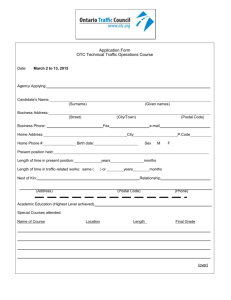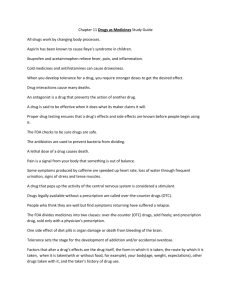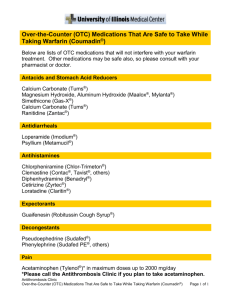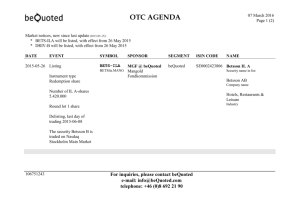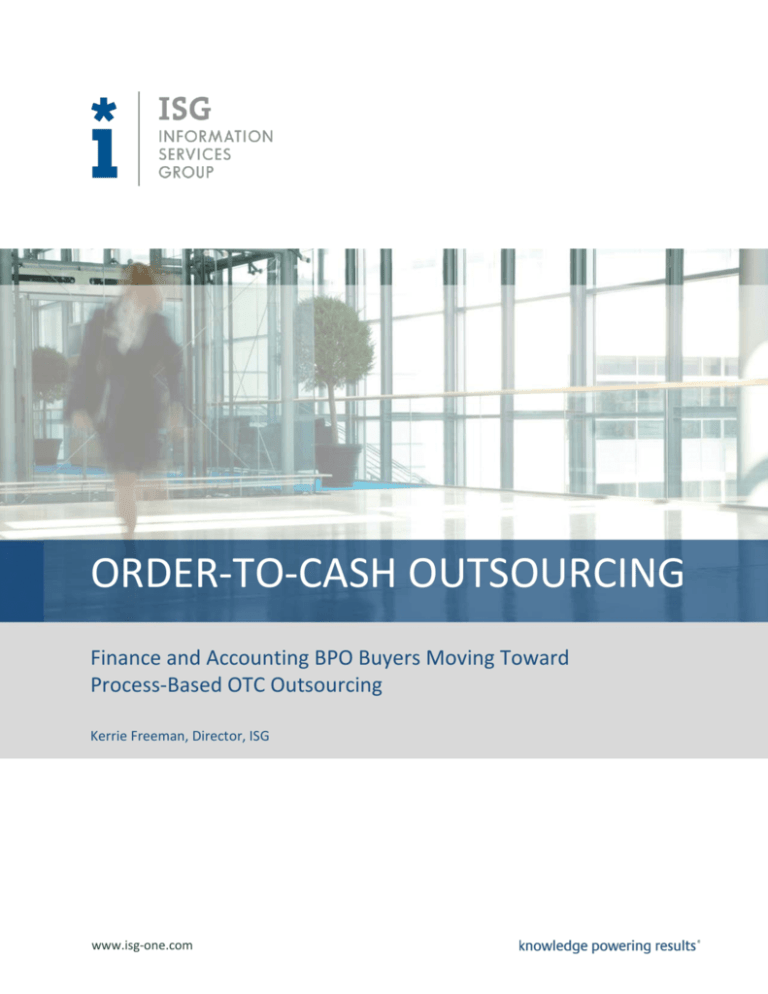
ORDER-TO-CASH OUTSOURCING
Finance and Accounting BPO Buyers Moving Toward
Process-Based OTC Outsourcing
Kerrie Freeman, Director, ISG
www.isg-one.com
INTRODUCTION
To date, the majority of order-to-cash (OTC) outsourcing has been focused on
outsourcing two or three functions, such as invoicing, cash applications, and
collections. This has traditionally occurred in the “invoice-to-cash” (ITC)
segment (see graphic below that captures OTC functions outsourced among
larger companies where the total contract value is more than US$25 million).
This trend is shifting. In our view, the development of service providers’
capabilities to provide end-to-end OTC outsourcing solutions is the key trend
in the OTC arena over the past five years and will likely continue as companies
(buyers) are moving toward outsourcing their entire OTC process instead of
just outsourcing selected functions. In other words, service providers are
beginning to see a return on their investment in OTC.
This paper discusses the reasons for the market’s shift from function-based to
process-based (i.e., end-to-end) OTC outsourcing, including observations on
other emerging trends affecting OTC solutions.
Order-to-Cash Processes Included in Outsourcing Contracts
100%
80%
60%
40%
20%
0%
Order Mgmt.
Credit
Billing/ Invoice
A/R
Collection
N = 315 contracts as of 12/31/07
Source: TPI Prevalence Database™
OTC OUTSOURCING
■
KERRIE FREEMAN
1
OTC OUTSOURCING SHIFT
There are multiple definitions of the OTC process that include all or part of the OTC equation. As illustrated below, ISG
defines “OTC” as the end-to-end cycle starting with order management, credit, invoicing, cash applications, collections and
dispute management, and proceeding to reporting and analysis. The definition is important because each component or
sub-process has varying levels of adoption in the marketplace, and it is helpful in understanding trends that we see evolving
in OTC outsourcing.
Order to Invoice (OTI)
Order Management and
Order Entry
Credit
Management
+
Invoicing/
Billing
Invoice to Cash (ITC)
Receivables
{Remittance
Processing
Collections
=
Dispute
Resolution &
Deduction
Mgmt.
OTC
Reconciliation
Reporting and
Reserve
Analysis
Credit management can be part of an OTI scope or part of ITC scope
SHIFT FROM FUNCTION-BASED TO PROCESS-BASED OUTSOURCING
One of the most significant challenges in outsourcing OTC is working cross-functionally with the multiple departments
involved with the various OTC functions. This is particularly true when addressing customer order, shipping, billing,
collection, and dispute-resolution problems that occur across the OTC process. Traditionally, order management resides in
the sales organization, with billing, receivables, and collections in the accounting group and operations in the supply chain
organization. Depending on the company, credit management may be part of the sales or the accounting organizations, and
in some cases, may actually be split between these two groups. Not surprisingly, undefined boundaries can cause process
disconnects, errors, and friction within a company along with a lack of transparency in problem solving. Consequently, once
a problem is known, it cannot be solved in a vacuum and thus takes the teamwork of various organizations to piece
together the solution.
From an outsourcing perspective, the more integrated the OTC process, the more efficient the solution. In fact, including
“order management” activities in the outsourcing scope — instead of just invoice-to-cash — is an even better solution
because both the company outsourcing the processes and the service provider are now tapped into the upstream activities
that impact the problems and issues found in the downstream functions like remittance processing and dispute resolution.
To help mitigate these issues in OTC processing, companies must implement visibility into the data and communication
process. Readily available quantitative and qualitative information is a requirement for successful processing and issue
resolution in OTC. This comes with highly integrated processes that are typically supported with integrated ERP platforms.
Today, most companies are in various stages of implementing ERP solutions, and most continue to rely upon internal legacy
applications to some extent. Many companies have sought to use overlay tools that give visibility into different data across
differing systems. Service providers in the OTC space bring these tools to the table, enabling companies to integrate their
OTC functions.
Automating and tracking the cycle of cash flow from order management through to cash application is becoming
increasingly attractive as a transformational opportunity with companies. Transformation and the ability for the service
provider to bring full process redesign and technology solutions have become key drivers of the OTC process approach.
Functional OTC solutions tend to result in piecemeal and less integrated solutions.
The focus on cash flow coupled with the realization by buyers that OTC outsourcing can provide more than just costreduction benefits have also supported the shift to a process-based versus functional approach. Service providers can offer
significant value by improving the company’s financial position through increased cash and working capital levels, which in
turn provide benefits of increased funds for investment and/or decreased debt levels to the company. Decreased receivable
DSO (“day’s sales outstanding”) is best achieved through managing the end-to-end OTC process, where processing errors
and snags are minimized.
OTC OUTSOURCING
■
KERRIE FREEMAN
2
The turf and politics of “who owns what” is shifting in
today’s OTC scope discussions as the benefits of end-toend OTC solutions are creating a climate where the
various domain owners, such as finance, sales, and
operations, are working together to develop the best
solution for the company. And service providers are
anxious to deliver these end-to-end solutions to
capitalize on their increasing investment in and
development of end–to-end OTC tools and processes.
SHIFTING BUYER INTEREST FROM
OFFSHORING TO COMPANY
TRANSFORMATION
Service provider solutions have traditionally focused on
the wholesale “lift and shift” method of migrating
existing company processes to offshore centers. Today,
however, most of the major service providers have
established offshore capabilities with multiple global
service centers linked by technology and
telecommunications infrastructures that provide lowcost, workload balancing, and disaster recovery /
business continuity capacity. In effect, providing offshore
capability has been the price of admission for playing in
the large-company business process outsourcing (BPO)
segment.
OTC transformational solutions have been evolving, and
some service providers have taken aggressive steps to
quickly build their OTC capabilities, as evidenced by the
acquisitions of niche receivable and collection
management companies (examples are IBM’s purchase
of Equitant in 2004 and the Genpact acquisition of
Creditek in 2005). Other providers have focused on
building their own tools and processes to enhance their
OTC abilities. As discussions increasingly center on
process transformation, service provider investments in
OTC capabilities are likely to speed up as larger players
continue to acquire niche players to gain or develop OTC
proprietary tools and processes.
As buyers recognize the benefits of OTC process
transformation, their finance and accounting (F&A)
optimization interest continues to shift from the service
providers’ offshore capabilities to their transformational
capabilities to drive the cost, efficiency, and service
quality requirements for the future.
WEIGHING CUSTOMER SERVICE VERSUS THE
COST-REDUCTION TRADEOFF
companies react to increased levels of customer
complaints — both internal and external — that come
with offshore outsourcing. Customer complaints are
most often attributed to language barriers and delays in
getting issues resolved, which result in frustrated and
dissatisfied customers.
OTC buyers have come to value customer language and
time zone compatibility so highly that, in some cases,
they are willing to trade off some of the cost-saving
benefits from offshore solutions for better service and
higher customer satisfaction that comes with onshore or
near-shore alternatives. For OTC, where customer
satisfaction is critical, we expect to see the interest in
onshore and near-shore customer call centers increase.
This includes solutions designed with separate, but highly
integrated front-office (same or near-shore) and backoffice (offshore) arrangements that provide seamless
communication and processing capabilities. We would
not be surprised to see a reversal of some existing
contracts whereby current offshore activities switch to
onshore and near-shore solutions.
ANALYZING WHERE STANDARDIZED IS BETTER
THAN CUSTOMIZED
As discussed, service provider investment in end-to-end
OTC solutions will continue. On top of the many other
benefits of this trend, the push for less labor-intensive
solutions will drive investments toward integrated
technology and processes. Functions will be redesigned
to minimize processing activities, such as reducing
reconciliations, and eliminate the errors and disconnects
that result in time-consuming investigation and
correction processing.
As part of the technology push, ERP platforms will be
implemented with less emphasis on customized
applications. The benefits of standard ERP solutions with
lower cost, less maintenance, and less complexity will
outweigh the benefits of customized applications
especially in transaction-based functions that add little
value.
Most ERP standardization will likely occur in the ITC
segment as many companies continue to demand
custom processes in upstream order-management and
order-processing functions to meet their customerspecific requirements as well as their own complex
product/service/term requirements.
Buyers of OTC services have become much more
sensitive to service provider call center capabilities as
OTC OUTSOURCING
■
KERRIE FREEMAN
3
F&A “CORE” BECOMING “NON-CORE”— IMPACT ON OTC
BPO F&A outsourcing (FAO) is moving up the F&A process curve as increased service provider capabilities in analytics and
decision support are creating the market for higher-end functions. This is consistent with the push by some of the larger
multifunction service providers and India-based service providers to expand their resources in business performance
analysis, forecasting, and analytics.
This capability is particularly important in OTC because it enables service providers to move beyond just invoicing and
collections into bundled processes that span company divisions to provide dispute resolution, analytics, and report
capabilities. It is also consistent with providing full OTC process services.
FAO SERVICES
Transactional and general accounting activities continue to be the core base of F&A contracts. However, FP&A and
decision support services are emerging.
M&A Management
Treasury Management
Audit and Risk Mgmt.
Tax Planning & Regulatory
Tax Actng, Filing & Rprting
Enterprise Value Added
High
New Business/Pricing Analysis
Bus. Performance Anals. & Rpting
Cost Analysis
Strategic Planning Support
Budgeting
Outlook/Interim Forecast
External Reporting
General Accounting
Project Accounting
Cost Accounting
Fixed Assets
Credit
Order Management
Billing / Invoicing
Cash Apps / Accounts Receivable
Collections
Accounts Payable
T& E Reimbursement
Payroll*
Complexity of Interaction
Basic
Corporate Services
& Mgmt.
Decision Support
Financial
Planning & Analysis
Accounting & Reporting
Revenue Cycle
Disbursements
High
* Payroll may report to CFO or HR
OTC MARKETPLACE ACTIVITY
In the past 12 months, our observations of F&A activities within BPO indicate a marked increase in the level of interest and
activity occurring in the OTC segment. We believe this upswing is based on a convergence of interest in OTC activities by
these BPO F&A stakeholder groups:
Buyers: Increased interest in exploring service provider OTC capabilities through the RFP and proposal process
together with an increase in contracting for OTC services.
Service providers: Increased investments in OTC capabilities and solutions, including strategic acquisitions of niche
receivable management / collection companies in order to expand end-to-end OTC service capabilities.
Outsourcing research and journal organizations: Increased amount of articles surveying, analyzing, and discussing
the OTC segment.
OTC OUTSOURCING
■
KERRIE FREEMAN
4
The increase in OTC activity is certainly not unanticipated, as it reflects the evolution and expansion of services occurring in
F&A outsourcing. The difference is that OTC seems to be taking the spotlight, especially as buyers seek the benefits of endto-end process solutions. It’s the direction the activity is moving that is changing — and full-process OTC outsourcing is
where buyers and sellers are headed.
CONCLUSION
With businesses more cognizant than ever about the bottom line and customer satisfaction, F&A BPO users want exactly
what the acronym implies — business process optimization. To meet their objective and please their shareholders, buyers
are moving away from outsourcing parts of a function to obtain modest savings or process improvements. Instead, they are
taking a more holistic approach by looking at the entirety of their F&A processes to gain larger savings and process
improvement opportunities.
Service providers recognize the opportunities and are no longer simply “lifting and shifting” a client’s operations. They are
building their OTC capabilities in order to provide complete OTC solutions that will continue to be demanded of them.
OTC OUTSOURCING
■
KERRIE FREEMAN
5
LOOKING FOR A STRATEGIC PARTNER?
Your operational excellence is our business.
Visit the AccessISG™ Sourcing Portal for more sourcing information, insight and tools.
Click the envelope to contact us or go to http://info.isg-one.com/ContactUs.
CONTACT US
Information Services Group (ISG) (NASDAQ: III) is a leading technology insights, market intelligence and advisory services
company, serving more than 500 clients around the world to help them achieve operational excellence. ISG supports private and
public sector organizations to transform and optimize their operational environments through research, benchmarking, consulting
and managed services, with a focus on information technology, business process transformation, program management services
and enterprise resource planning. Clients look to ISG for unique insights and innovative solutions for leveraging technology, the
deepest data source in the industry, and more than five decades of experience and global leadership in information and advisory
services. Based in Stamford, Conn., the company has more than 850 employees and operates in 21 countries. For additional
information, visit www.isg-one.com.
010612
© Copyright 2012 Information Services Group – All Rights Reserved

